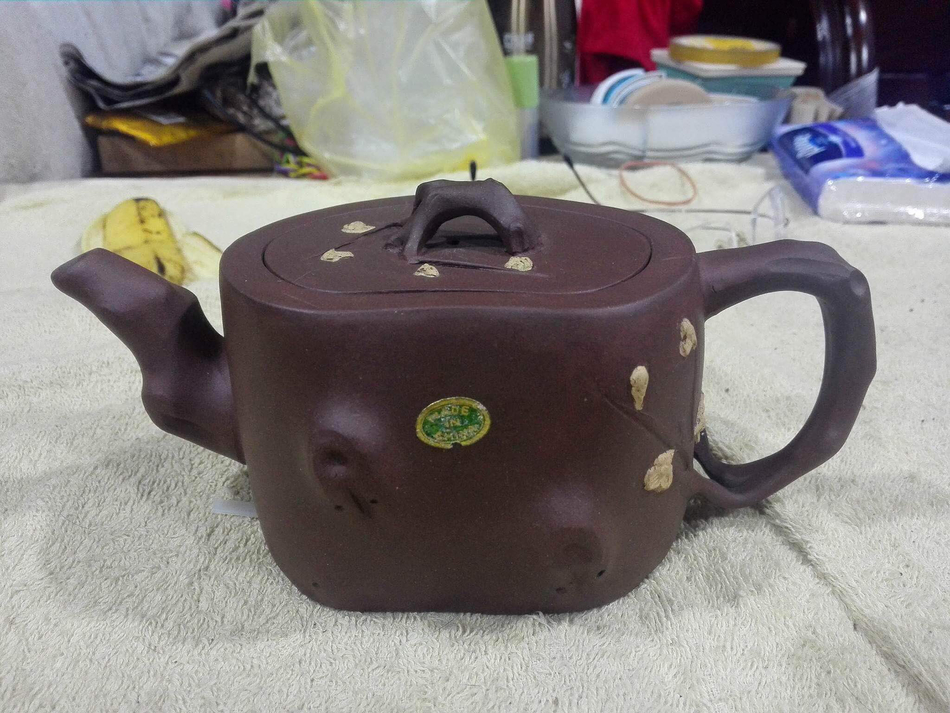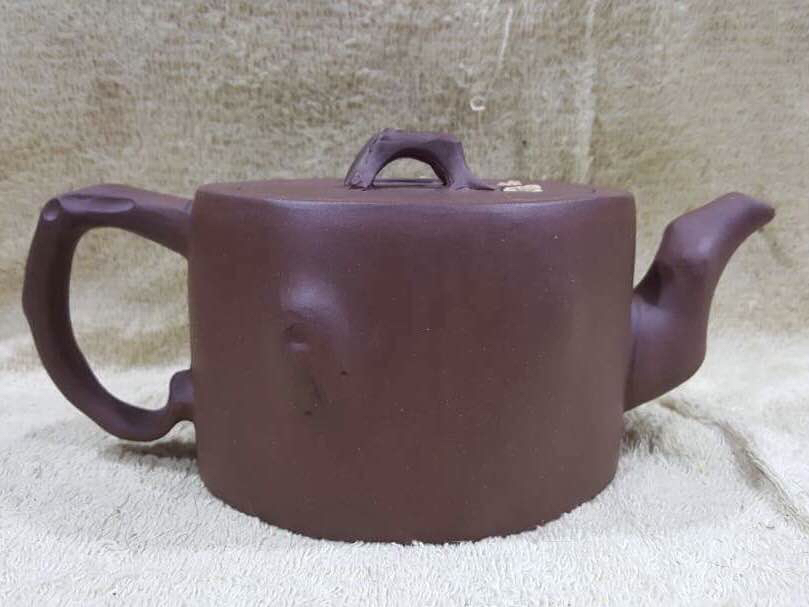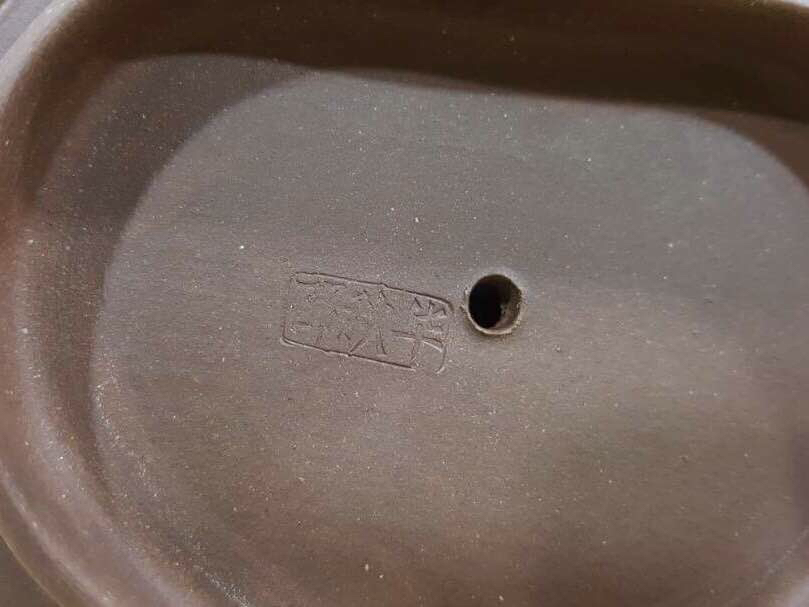Yixing
Mark-S wrote: ↑Wed Apr 22, 2020 12:50 amDailyTX
I am not sure about this pot, but it has a green label sticker AND an unusual seal on the bottom of the pot. However, I do not know if it's the artists name or something else.
viewtopic.php?p=21054#p21054
Unfortunately, no one could answer me if this pot is genuine or not. I have seen a similar one, but it could also be a fake.
@Mark-S
Allow me to illustrate.
There is an authentic Green Label sticker on this pot. In your opinion, do you think this is an authentic Green Label F1 pot?? Workmanship is pretty good.
Cheers!!
@OCTOOCTO wrote: ↑Wed Apr 22, 2020 12:51 amDailyTX wrote: ↑Wed Apr 22, 2020 12:19 am
Looks like an interesting discussion on stamps/chops. I was looking at F1 stamps a month or two ago, and I found some Chinese articles saying names of artist were used as stamps/chops to replace zhongguo yixing and mengchen started after mid 1980s due to influence by import regulations in Taiwan. I wonder if anyone owns a green label F1 pot, plain or decorative with artist name as stamps/chops?
DailyTX
Very interesting question! Again... I've seen both..... BUT... here is where it get's tricky and extremely confusing. We know that in the 80s there is a sudden surge in Yixing clay pot demand from Taiwan. Many collectors and tea merchants from Taiwan took samples of GreenLabel F1 pots back to F1 China and requested them to be made in large quantities. Some added their own preferred designs. Do bear in mind that this is an era where in China, you can have anything made / remade as long as u have the cash.
1. There are pots seen in Taiwan that was never seen in at the other ends of the globe. Not even in Asia. It was when travel was made easy, you start to see Taiwan-Market Yixing pots start to surface in countries outside of Taiwan.
2. Export teapots to Japan, Taiwan and Thailand all bears different key workmanship signatures aside from the main workmanship signatures. There are some pots that we see here and branded as "FAKE" (due to lack of knowledge and documentation), are actually authentic when more collectors stood up and documented their findings. I have personally mistook a Japanese export pot to be a FAKE because I have never seen such a pot design. Only until I managed to cross reference with a collector friend with knowledge of Japanese export pots, only was I able fully understand what I mistook as a fake.
3. I have a very nice pear shape pot from late 70s to 80s with a seal that bears the name of the artist. It was intended as a Taiwan export model and was never seen inside F1 catalogues and never seen in local tea stores.
It's all a journey... made easier with the internet.
Cheers!!
Fascinating journey and experience you have and encountered. I love to see your rare friends come out to play
I agree that 80s was an interesting decade for F1 and yixing, so much changes and influence from money, politics, and creativities
@Mark-SMark-S wrote: ↑Wed Apr 22, 2020 1:01 amDailyTX
viewtopic.php?p=20221#p20221
Sorry for the bad quality. I cannot take new pictures right now. The teapot should be genuine.
Ah...much better photos to capture the right angles. I would probably buy it as green label based on those photos
Mark-S
Allow me to illustrate.



There is an authentic Green Label sticker on this pot. In your opinion, do you think this is an authentic Green Label F1 pot?? Workmanship is pretty good.
Cheers!!
[/quote]
@OCTO
The stick indeed looks genuine haha
Allow me to illustrate.
There is an authentic Green Label sticker on this pot. In your opinion, do you think this is an authentic Green Label F1 pot?? Workmanship is pretty good.
Cheers!!
[/quote]
@OCTO
The stick indeed looks genuine haha
@OCTO
No, I don't think that this is a green label F1 pot. At least if I remember it right this style looks a bit different in comparison to a confirmed one posted in the Facebook group. I would have to check it again though to be sure.
Do you really think that my large teapot is a fake? I have seen the same one in another Chinese Facebook group and it was labeled F1. It was sold for $500 or something like that. Way too much, I know. Even if it's genuine.
It was sold for $500 or something like that. Way too much, I know. Even if it's genuine.
@DailyTX
I bought this one from an experienced collector. That's the reason I am sure it's genuine The craftsmanship is perfect.
The craftsmanship is perfect.
No, I don't think that this is a green label F1 pot. At least if I remember it right this style looks a bit different in comparison to a confirmed one posted in the Facebook group. I would have to check it again though to be sure.
Do you really think that my large teapot is a fake? I have seen the same one in another Chinese Facebook group and it was labeled F1.
@DailyTX
I bought this one from an experienced collector. That's the reason I am sure it's genuine
This is a F2 pot, F2 clay, but with a pretty decent workmanship. The seller removed the green label sticker from another pot and moved it to this pot. You will find such cases happening when beginners start buying pots and authenticating them based on stickers alone. This pot feels extremely light by feel of hand. Not the usual weighted feel you get from F1 pots. Doesn't mean it's a lousy pot. You just need know how to maximise and optimise the pot.
Cheers!!
This one is genuine, right? At least this clay looks similar to most green label Zini pots I own. (I know it's a larger version)
https://m.facebook.com/100028267158462/ ... 445800657/ (last picture)
@Mark-S The link above is broken....Mark-S wrote: ↑Wed Apr 22, 2020 1:53 amThis one is genuine, right? At least this clay looks similar to most green label Zini pots I own. (I know it's a larger version)
https://m.facebook.com/100028267158462/ ... 445800657/ (last picture)
These are interesting points. I too have been thinking about this terminology.
I would probably emphasize the intention of the potter, or the person/company who commissioned the production, more than the intention of the seller (as a pot can have many different sellers during its lifetime). Otherwise, the same pot could alternate between being a "fake" and a "replica" at different points of time (e.g. when it was produced and first sold it was an "honest" replica, but later as it changed hands and reached a more scrupulous seller who passed it off as a Qing pot, it suddenly became a "fake"), which doesn't make a lot of sense to me.
Of course, the fact that it's often impossible to know who the potter was (and he/she will in most cases have passed away) doesn't make things easier..
Perhaps it makes more sense to reserve the word "fake" for claims about clay, which can actually be verified (at least most of the time, no?) .
Even that can be difficult at times. I held a fake in hands not long ago, which was so perfect, the only thing that betrayed it was its weight...
@Mark-S: As a fellow European I've been wondering, where do you usually find your pots? (If it's not something you want to keep secret.) Are there auction sites in Germany with a reasonable selection of pots, or do you follow auction sites in other countries/continents?
This will be my first "Can you identify this teapot?" post. I know nothing about this teapot. I got it as a gift from a Grandma in Shanghai.
- Attachments
-
- IMG_3854.jpeg (221.21 KiB) Viewed 12017 times
-
- IMG_3852.jpeg (179.05 KiB) Viewed 12017 times
-
- IMG_3857.jpeg (179.4 KiB) Viewed 12017 times
